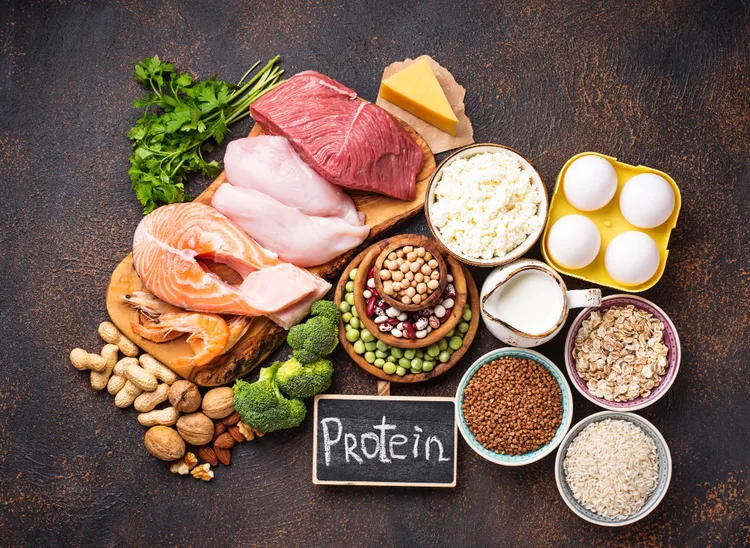10 Signs You're Not Eating Enough Protein: A Comprehensive Guide
Protein is a critical macronutrient that plays a vital role in nearly every function of the human body. From building and repairing tissues to producing enzymes, hormones, and antibodies, protein is essential for maintaining health, energy, and vitality. Despite its importance, many people unknowingly consume inadequate amounts of protein, which can lead to a cascade of physical, mental, and emotional symptoms. In this in-depth blog post, we’ll explore the signs that you’re not eating enough protein, why it matters, and how to address it.

Why Protein Matters
Before diving into the signs of protein deficiency, let’s briefly review why protein is so crucial. Proteins are made up of amino acids, often referred to as the "building blocks" of life. These amino acids are used to:
- Build and repair muscles, bones, skin, and other tissues.
- Support immune function through the production of antibodies.
- Facilitate enzymatic reactions that drive metabolism.
- Transport oxygen and nutrients in the blood.
- Regulate hormones that control mood, appetite, and energy levels.
The Recommended Dietary Allowance (RDA) for protein is 0.36 grams per pound of body weight (0.8 grams per kilogram) for adults, but this is a baseline for preventing deficiency, not optimizing health. Active individuals, older adults, pregnant women, and those recovering from illness or injury may need significantly more—often 0.5 to 0.9 grams per pound (1.2 to 2.0 grams per kilogram) depending on their goals and activity levels.
When you don’t consume enough protein, your body can’t perform these functions effectively, leading to a range of symptoms. Below are the key signs that you might not be getting enough protein in your diet.
- Constant Hunger or Cravings
One of the earliest and most noticeable signs of inadequate protein intake is persistent hunger or intense cravings, particularly for sugary or carbohydrate-rich foods. Protein is highly satiating, meaning it helps you feel full and satisfied after meals. It does this by:
- Slowing digestion, which keeps food in your stomach longer.
- Regulating blood sugar levels to prevent spikes and crashes.
- Influencing appetite-regulating hormones like ghrelin and peptide YY.
If you’re eating enough calories but still feel hungry shortly after meals, your diet may lack sufficient protein. For example, a breakfast of toast and juice might provide quick energy but leave you ravenous by mid-morning. In contrast, a protein-rich breakfast with eggs, Greek yogurt, or a protein shake can keep you full for hours.
What to watch for: Feeling hungry soon after eating, frequent snacking, or intense cravings for sweets or carbs.
- Muscle Loss or Weakness
Protein is essential for maintaining and building muscle mass. When you don’t consume enough, your body may break down muscle tissue to access amino acids for other critical functions, such as immune support or tissue repair. This process, known as muscle catabolism, can lead to:
- Loss of muscle mass (sarcopenia), especially in older adults.
- Decreased strength and stamina during workouts or daily activities.
- A "soft" or less defined appearance, even if you’re exercising.
This is particularly concerning for athletes, weightlifters, or anyone engaging in resistance training, as inadequate protein can hinder muscle recovery and growth. Even non-athletes may notice they feel weaker or tire more easily when protein intake is low.
What to watch for: Reduced muscle tone, difficulty lifting weights you once handled easily, or feeling physically weaker over time.
- Fatigue and Low Energy
Feeling sluggish or tired all the time? Protein deficiency could be a culprit. Amino acids from protein are used to produce neurotransmitters like dopamine and serotonin, which regulate energy and mood. Additionally, protein helps stabilize blood sugar levels, preventing the energy crashes associated with high-carb, low-protein meals.
Without enough protein, you may experience:
- Persistent fatigue, even after adequate sleep.
- Difficulty concentrating or "brain fog."
- Low motivation or a sense of lethargy.
For example, if your diet relies heavily on processed carbs like bread, pasta, or sweets, you may experience energy spikes followed by crashes, leaving you drained. Incorporating protein into every meal can provide a steady source of energy.
What to watch for: Chronic tiredness, difficulty staying focused, or feeling unmotivated despite adequate rest.
- Brittle Hair, Nails, and Skin Issues
Your hair, nails, and skin are made up of proteins like keratin and collagen. When protein intake is insufficient, your body prioritizes vital functions (like organ repair) over maintaining these tissues, leading to noticeable changes:
- Hair: Thinning, brittle, or falling out more than usual. You might notice more hair in your brush or shower drain.
- Nails: Weak, brittle, or peeling nails that break easily.
- Skin: Dry, flaky, or dull skin, or slower wound healing.
These symptoms often appear gradually and may be mistaken for aging or other deficiencies (like iron or biotin). However, chronic low protein intake is a common underlying cause.
What to watch for: Hair loss, brittle nails, or skin that looks lackluster or heals slowly.
- Frequent Illness or Weak Immune System
Protein is a cornerstone of a healthy immune system. Antibodies, which help fight off infections, are made of proteins, and immune cells rely on amino acids to function properly. If you’re not eating enough protein, your immune system may weaken, making you more susceptible to:
- Frequent colds or infections.
- Longer recovery times from illness or injury.
- Feeling "run down" more often.
This is especially critical during times of stress, illness, or recovery, when your body’s demand for protein increases.
What to watch for: Getting sick more often or taking longer to recover from minor illnesses.
- Mood Swings or Irritability
Your brain relies on amino acids to produce neurotransmitters that regulate mood, such as serotonin, dopamine, and norepinephrine. Low protein intake can disrupt this balance, leading to:
- Mood swings or irritability.
- Feelings of anxiety or low mood.
- Difficulty managing stress.
For example, the amino acid tryptophan (found in protein-rich foods like turkey, eggs, and fish) is a precursor to serotonin, which promotes feelings of calm and happiness. Without enough protein, your brain may struggle to maintain optimal neurotransmitter levels.
What to watch for: Increased irritability, anxiety, or feeling emotionally "off" without a clear cause.
- Swelling (Edema)
In severe cases of protein deficiency, you may experience swelling in your hands, feet, ankles, or abdomen, a condition known as edema. This occurs because protein, particularly albumin, helps maintain fluid balance in your blood vessels. When protein levels are low, fluid can leak into surrounding tissues, causing puffiness or swelling.
While edema is more common in extreme protein deficiency (e.g., malnutrition), it can occur in milder cases, especially if you’re consuming very little protein over an extended period.
What to watch for: Unexplained swelling, particularly in the extremities or abdomen.
- Difficulty Losing Weight or Maintaining Weight Loss
If you’re struggling to lose weight or keep it off, low protein intake might be sabotaging your efforts. Protein supports weight management in several ways:
- Increases satiety: Protein-rich meals reduce hunger, making it easier to stick to a calorie-controlled diet.
- Boosts metabolism: The thermic effect of food (TEF) is higher for protein than for carbs or fats, meaning your body burns more calories digesting it.
- Preserves muscle: Maintaining muscle mass during weight loss helps sustain your metabolism, as muscle tissue burns more calories at rest than fat.
Without enough protein, you may overeat due to hunger, lose muscle mass (slowing your metabolism), or struggle to maintain weight loss.
What to watch for: Plateaus in weight loss, difficulty feeling satisfied after meals, or regaining weight quickly.
- Slow Recovery from Injuries
Protein is essential for tissue repair and recovery. If you’re not eating enough, your body may struggle to heal wounds, bruises, or muscle soreness from exercise. This is because amino acids are needed to rebuild damaged tissues and produce collagen, a key component of connective tissue.
Athletes or those recovering from surgery or injury are particularly at risk, as their protein needs are higher during these times.
What to watch for: Slower healing of cuts, bruises, or muscle soreness that lingers longer than expected.
- Hormonal Imbalances
Protein plays a role in hormone production and regulation. For example, amino acids are needed to synthesize insulin, thyroid hormones, and reproductive hormones. Low protein intake can disrupt these processes, leading to:
- Irregular menstrual cycles in women.
- Low energy or libido due to imbalanced thyroid or sex hormones.
- Blood sugar dysregulation, which can mimic symptoms of diabetes or hypoglycemia.
If you’re experiencing unexplained hormonal symptoms, it’s worth evaluating your protein intake alongside other factors like stress or medical conditions.
What to watch for: Irregular periods, low libido, or symptoms of blood sugar imbalances like shakiness or irritability.
Who’s at Risk for Protein Deficiency?
While severe protein deficiency (e.g., kwashiorkor) is rare in developed countries, suboptimal protein intake is surprisingly common. Groups at higher risk include:
- Vegans or vegetarians: Plant-based diets can be protein-rich, but it requires careful planning to meet needs, as plant proteins are often less bioavailable and may lack certain essential amino acids.
- Older adults: Aging reduces muscle mass (sarcopenia), and many older adults don’t consume enough protein to counteract this.
- Athletes or highly active individuals: Intense exercise increases protein needs, and inadequate intake can impair performance and recovery.
- Dieters: Restrictive diets, especially low-calorie or low-protein fad diets, can lead to deficiency.
- Those with digestive issues: Conditions like Crohn’s disease or celiac disease can impair protein absorption.
How to Ensure You’re Getting Enough Protein
If you suspect you’re not eating enough protein, here are actionable steps to increase your intake:
- Calculate Your Needs: Aim for 0.5–0.9 grams of protein per pound of body weight, depending on your activity level. For example, a 150-pound sedentary person needs about 54–75 grams daily, while an active person may need 75–135 grams.
- Include Protein in Every Meal: Spread your intake throughout the day for optimal absorption and satiety. Examples:
- Breakfast: Greek yogurt with nuts, eggs with veggies, or a protein smoothie.
- Lunch/Dinner: Chicken, fish, tofu, lentils, or lean beef with vegetables.
- Snacks: Hard-boiled eggs, cottage cheese, hummus with veggies, or protein bars.
- Choose High-Quality Sources:
- Animal-based: Eggs, chicken, turkey, fish, lean beef, Greek yogurt, cottage cheese.
- Plant-based: Lentils, chickpeas, tofu, tempeh, edamame, quinoa, seitan, or protein powders (pea, hemp, or rice protein).
- Supplement if Needed: Protein powders (whey, casein, or plant-based) can be a convenient way to boost intake, especially for athletes or those with busy schedules.
- Monitor Symptoms: Track how you feel after increasing protein intake. Improved energy, reduced hunger, and better recovery are signs you’re on the right track.
- Consult a Professional: If you’re unsure about your needs or suspect a deficiency, consult a dietitian or doctor for personalized guidance.
Protein is a non-negotiable nutrient for optimal health, yet many people fall short without realizing it. From persistent hunger to muscle loss, fatigue, and weakened immunity, the signs of inadequate protein intake can significantly impact your quality of life. By recognizing these symptoms and making intentional dietary changes, you can ensure your body gets the protein it needs to thrive.
If you’re experiencing any of these signs, take a closer look at your diet and consider increasing your protein intake. Small changes, like adding a serving of eggs to breakfast or swapping rice for quinoa, can make a big difference. Your body—and mind—will thank you.
Disclaimer: This blog post is for informational purposes only. If you suspect a severe protein deficiency or have persistent symptoms, consult a healthcare professional for proper diagnosis and treatment.









